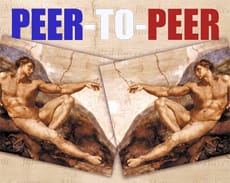For the past few weeks, although overshadowed by the CPE, the controversy regarding the DADVSI bill has been slowly growing among the ranks of the opposition but also within the majority.
In this regard, Nice Première met with Deputy Jérôme Rivière who participated in various debates on this thorny issue of downloads.
Where does the debate stand? What are the solutions? The digital rights management software? The famous government website www.lestelechargements.com costing 180,000 euros including taxes?
– Find the latest articles on the DADVSI bill
– Find articles on the site www.lestelechargements.com
Nice Première: Jérôme Rivière, what is your stance on the copyright debate?
Jérôme Rivière: I regret the lack of “encouraging” alternatives to the bill on copyright rights, which resumed discussion at the Assembly after a two-month break. Initially, I think the article that established the global license, voted by the Assembly in December and withdrawn by the government on Monday, was worthy of the peak years of Soviet centralized collectivism. Its principle is simple but falsely egalitarian.
I cannot subscribe to this logic that denies merit and success. But alas, the proposal made by the government favors DRM (Digital Rights Management technical measures), locking keys which constitute restrictions on freedom.
Nice Première: What would be your solutions?
JR: Parliament does not always have an answer to everything, which is why consultation is an indispensable tool for government decision-making. This net economy is different from the models we know and understand. I regret that a broader debate was not initiated, particularly with internet users, to bring out a solution that remains to be invented.
Nice Première: What do you think of digital rights management software?
JR: These locking keys or small computer programs, inserted into files with “artistic” content or in certain playback software to check, monitor, and control that no illegal copies are made and especially to make sending this file over the web impossible, can be real constraints on freedom.
Two examples to explain these freedom restrictions. Some internet users are already noticing today that the presence of peer-to-peer software on their computers prevents certain copying software (whether legal or not), editing, or gaming, from functioning.
Today when you buy music or a movie on a cassette, CD, or DVD, it is possible to use it wherever you choose. Tomorrow, when you have paid for and downloaded a movie, you will not be able to send it over the net, for example to a friend’s computer where you want to have a movie night! It will be essential to burn this video file onto a DVD type medium for which you will again have paid a tax.
For these reasons, I fear that this text may become in practice a negation of the principle of the net.
Nice Première: The Minister of Culture has opened a new site on this topic. What do you think?
JR: I gather you are referring to the site https://lestelechargements.com? If my memory serves me right, it went online at the end of February for a debate at the National Assembly two weeks later… As I told you, a consultation with web users was essential, but this clearly was not the broad debate with internet users that I referred to!
Nice Première: A site based on a free platform (Open Source DotClear) that cost 180,000 euros. What is your opinion on this matter?
JR: I am learning from your question the cost of creating this site. I have browsed a few pages, many videos, but it seems very expensive just for a debate…


